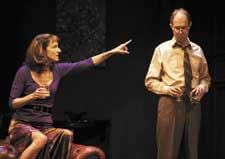In the New York Times, mid-’60s, Stanley Kaufman’s essay “Homosexual Drama and its Disguises” initiated a debate regarding Edward Albee’s play Who’s Afraid of Virginia Woolf? In a nutshell the argument suggests that the script is about four gay men. The rationale seems to have been that only gay men can bitch and bawl with the wit, cleverness and intensity that Albee has given his two central characters, George and Martha. Kaufman and his cohorts clearly had never been to a New Year’s Eve party at my parent’s home, circa 1969. Although the middle classes of the US eastern seaboard are a far cry from the working-class Ontario environment of my upbringing, I can attest to the heteronormative volatility and vitriol that entertained me in my youth.
In the current Soulpepper production, four gay guys might have served the script better than the extremely uneven het-icized cast currently in repertory at the Young Centre. And yet I fall prey to the same trap as Albee, who has vetoed all “gay” productions of his play because he feels they would distort his drama. By limiting the casting to any strict sexual formula one misses the whole point. The play is a comic drama of Chekovian proportions that hints wildly at the melding of truth and illusion that can sustain a kind of furious long-term relationship wrought by disappointment, despair, delusion and immense sexual desire.
Nancy Palk as Martha has the vitriol down pat, but her dominant screeching is annoying at the outset. By the time she reaches the third act it is clear that she has the vocal ability to create a sympathetic portrait of a frustrated academic wife. But instead of a well-balanced, multilayered Martha she has given us a broad, largely high-pitched caricature akin to Marge Simpson in A Streetcar Named Desire.
Director Diana LeBlanc’s multidimensional blocking and fine emotional levels have guided her other actors away from Palk’s rather one-dimensional choice. Diego Matamoros brilliantly delivers an understated and plausible foil to Martha’s ravings, while Tim Campbell’s Nick provides a handsome, blonde male bombshell whose confidence and arrogance render a powerful, testosterone-ridden portrait of biological prowess. As wife to Nick’s biology professor, Diana Donnelly’s Honey is rather uneven and awkward, but she does a mean interpretive dance and creates a sympathetic contrast to Martha’s crusty quips.
Astrid Janson’s designs do little to elevate the drama. Palk’s single costume change, from supportive wife to casual seductress, moves bewilderingly from mink stole to lush form-fitting bell bottoms more suitable for a pool party. Her change should be more daring and sexual than the pedestrian fitness-like garb Janson has chosen. The raked set replete with repetitive larger-than-life photos of enormous bookshelves sporting portraits of George and Martha Washington attempts to create a dizzying chaos but falls into an arena of dull, nonevocative earth tones that alienate rather than seduce.
A surprisingly youthful (teenaged) and enthusiastic rear-orchestra audience, during a Monday night performance, did reveal Albee’s “dramedy” as a fine example of the timelessness of one very clever three-hour bitchfest. Unfortunately, the current Soulpepper production fails to get at the heart of the matter. Palk’s wailing errs on the side of comedy, thereby stripping her of an essential humanity, making Martha and her cohorts sad instruments of hysteria that this play should never implement. Whether it is played clandestinely by a same-sex cast or made redundant by yet another foursome of heterosexual proportions, any successful production needs to give all of Albee’s characters the kind of insightful and seering complexity of a Virginia Woolf novel, marked sparingly by moments of great and terrifying comedy. The Souplepper production is just too too funny.

 Why you can trust Xtra
Why you can trust Xtra


